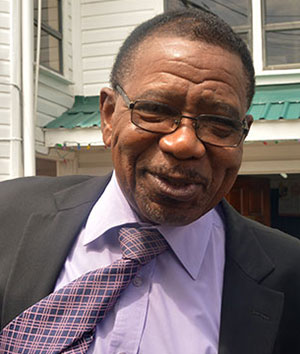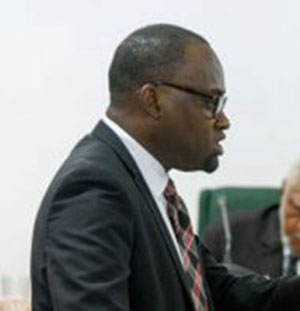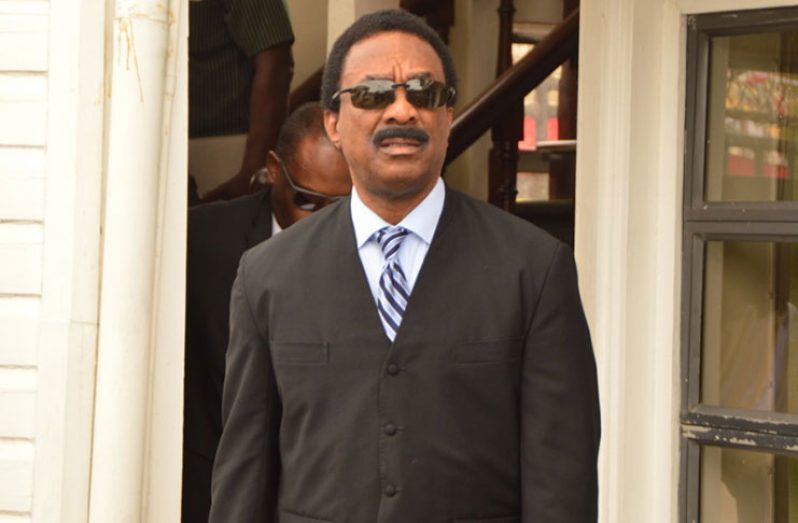– attorney general maintains
THERE is no “drop dead date” after the expiration of the 90-day timeframe for the holding of General and Regional Elections that would plunge Guyana into a constitutional crisis, Attorney General and Minister of Legal Affairs, Basil Williams said as he poured cold water on arguments put forward by the opposition and its allies.

Christopher Ram, an Attorney-at-Law, has accused President David Granger of “pushing Guyana towards the worst constitutional crisis in its history.” The parliamentary opposition – the People’s Progressive Party (PPP), in a similar vein, has argued that if the March 21 constitutional deadline for the holding of General and Regional Elections is not met or extended by a two-thirds majority in the National Assembly, the government will be throwing the country into a severe constitutional crisis. But the attorney general rubbished the arguments put forward while fielding questions from reporters outside of the Court of Appeal on Thursday.
Maintaining that the President and his government will remain in office to govern the country until a new president is sworn in, the attorney general said Article 106 (7) of the Constitution provides for that. That article states: “Notwithstanding its defeat, the government shall remain in office and shall hold an election within three months, or such longer period as the National Assembly shall by resolution supported by no less than two-thirds of the votes of all elected members of the National Assembly determine, and shall resign after the President takes the oath of office following the election.”

He pointed to the fact that the Constitution provides two options – election within three months or an extension by a two-thirds majority. With the Guyana Elections Commission (GECOM) indicating that it cannot facilitate elections by March 21, 2019, President Granger has activated the second provision outlined in Article 106 (7) by inviting the Opposition Leader, Bharrat Jagdeo to a meeting to discuss a possible extension. That meeting will take place on March 6, and according to the attorney general, it is a process that should be followed.
“It means that the section contemplates that after three months without an election, you move to the stage where the two parties talk to get a two-thirds majority, that has to be a process,” Williams said.
But if a stay is not granted to freeze the decision of the High Court or the President and opposition leader do not strike a compromise which would result in an extension of the constitutional deadline, “nothing happens,” according to the attorney general.
“There would be no constitutional crisis because there is a government,” he maintained while again referencing to Article 106 (7) which states that the government remains in office until a new President is sworn in. He noted too that it is GECOM that conducts elections and not the President or his government.
“I want you to understand that the nation was being unduly alarmed with these doom matter,” he said while maintaining that the government remains until.
Former Leader of the People’s National Congress, and Attorney-at-Law, Robert Corbin, like the attorney general, said Guyana is not in a constitutional crisis.
“The constitutional crisis exists in the minds of those who would like to see a crisis exist. The courts have a responsibility to ensure that there is peace, order and good governance of Guyana, just like the Executive and the Legislature,” Corbin told the Guyana Chronicle on Thursday.
He said the current situation is “good for Guyana” and is an evolution of the country’s political system.
“What is happening now is that for the first time, certain aspects and principles which are enshrined in our Constitution are being examined,” he said while noting that by putting forward legal challenges, the parties in the cases are seeking to establish certainty in the interpretation of the Constitution of Guyana. This, he posited, is good for posterity.
“So I think that it is healthy for Guyana to have this kind of exercise and I think that it is a little disappointing that one would not allow the courts to do their job,” he said.
In moving pass March 21, Corbin said the court will have to decide. “The court will have to take into account that what happens on the 21st March, 2019 would only be a crisis if the courts take certain positions on the matter, but I am sure that is a factor which the court must take into account in terms of what happens to Guyana. So I am not worried at this point in time,” he said.
Another attorney, Roysdale Forde echoed similar sentiments. He like Corbin and the attorney general, said there is no constitutional crisis, and the country is not likely to fall into one after March 21.
“I don’t believe that we will be heading into any constitutional crisis in the manner described by the persons who are articulating that view,” he posited. Citing Article 106 (7) of the Constitution, Forde said while it outlines a process, it does not state what should be done in the event the two-thirds majority is not acquired.
“…There is nothing in the Constitution that says if that vote is not carried on the 22nd day or the 91st day that the government ceases to exist. There will always be a Government of Guyana who will be in office,” he said.
Declaring that the government remains, Forde said it was in the past that the country experienced a constitutional crisis.











